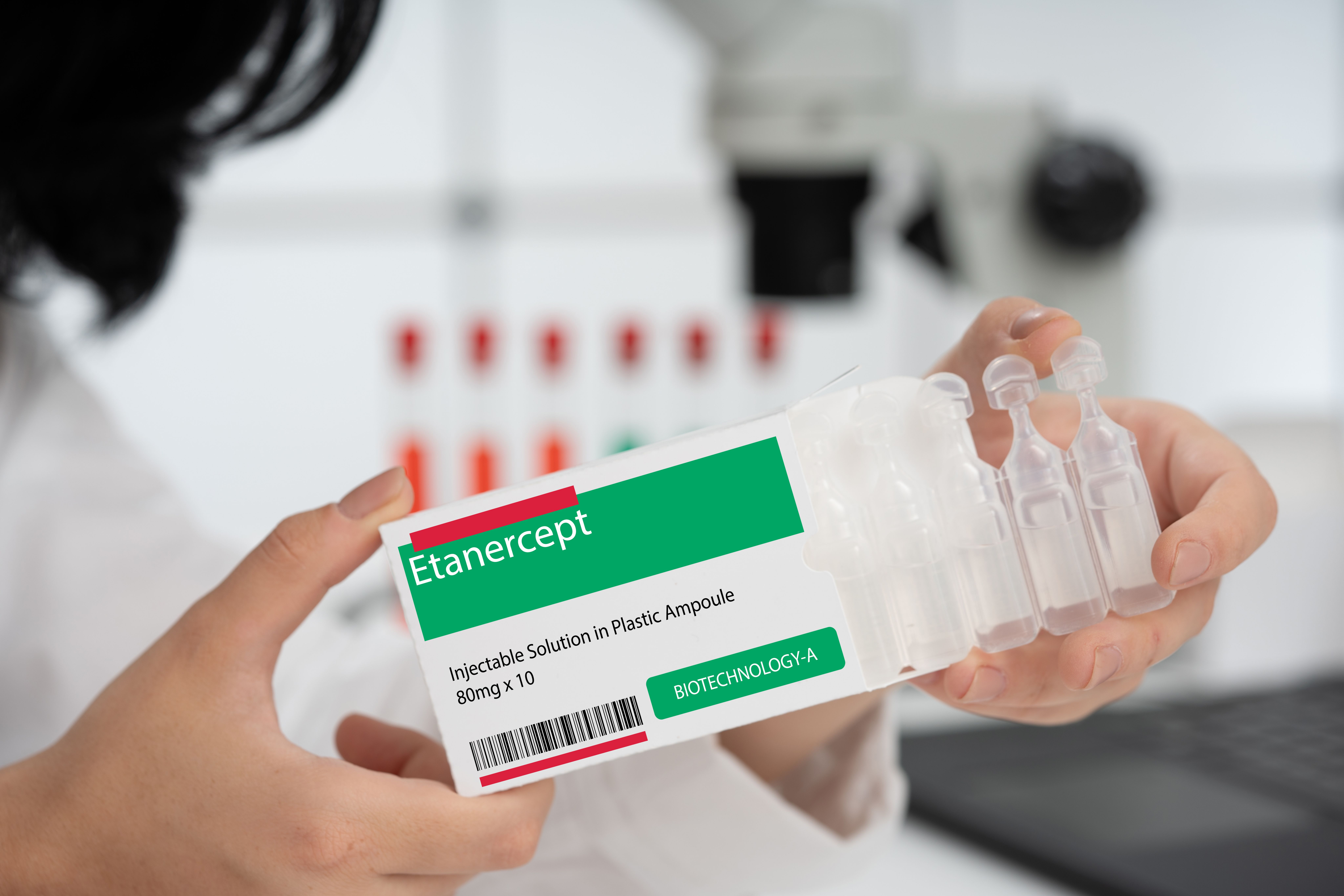- Bone Health
- Immunology
- Hematology
- Respiratory
- Dermatology
- Diabetes
- Gastroenterology
- Neurology
- Oncology
- Ophthalmology
- Rare Disease
- Rheumatology
Biosimilar Etanercept Similar to Enbrel in Persistence of Treatment, Cost Savings for Patients With RA
Etanercept biosimilar SB4 is just as effective as the originator drug (Enbrel) in treating Australian patients with rheumatoid arthritis (RA), leading to significant cost savings.
Etanercept medical injection | Image Credit: luchschenF - stock.adobe.com

An Australian study found the persistence of treatment was similar between the etanercept originator (ETN; Enbrel) and the biosimilar SB4 (Brenzys) treatment groups for patients with rheumatoid arthritis (RA), while considering the potential cost-savings implications.
In 2010, etanercept became available in Australia as the first ever biologic disease-modifying antirheumatic drug (bDMARDs) with tumor necrosis factor inhibitors (TNFis). This was a major achievement because RA drugs are often inaccessible for patient populations due to their expensive price, whereas a biosimilar option often offers a cheaper alternative. The Australian Therapeutic Goods Administration approved the first etanercept biosimilar in July 2016.
Due to costly medications, the Australian government implemented a reference pricing policy guaranteeing price reductions of new treatments with biosimilars. A base price is set using the Pharmaceutical Benefits Scheme, fixing the cost as the lowest-priced option listed. The government ensures their benefits from biosimilars by setting statutory price reductions and disclosures, allowing both the originator and biosimilar drugs to cheapen market costs. Overall, the Australian reimbursement system has encouraged clinicians to prescribe biosimilar treatments, but ultimately, they have their own discretion when choosing the brand.
The OPAL study included real-world data that was entered into a customized electronic medical record (Audit 4). Patient data were included if the patient had an RA diagnosis, were between 18 and 95 years old, and initiated treatment with originator or biosimilar etanercept as the first recorded bDMARD or targeted synthetic (ts)DMARD treatment with at least 3 months of follow-up. RA severity for the cohort ranged from moderate to severe.
A total of 1153 patients with RA were considered eligible, of whom 386 had at least 3 months of follow-up recorded. Propensity score (PS) matching was utilized to increase the similarity of the baseline demographic and clinical features of the patients in the originator and biosimilar treatment groups. In total, 350 were matched for analysis (ETN, n = 209; SB4, n = 141).
Most patients were older than 50 and women (ETN: ≥ 50 years, n = 100; female, n = 144; SB4: ≥ 50 years, n = 69; female, n = 98). Based on disease activity measures, slightly higher scores were presented in the originator group for the Physical Global Assessment, Patient Global Assessment, Disease Activity Score 28, Crohn Disease Activity Index, and Simplified Disease Index.
Efficacy was measured through treatment persistence among participants. The average duration of treatment from baseline to 50% of participants discontinuing therapy was 19.4 months for the originator and 22.4 for the biosimilar. Both groups had participants who experienced adverse reactions, leading 25 patients on the originator and 17 patients on the biosimilar to discontinue treatment. The most common adverse reactions were rashes and injection site reactions (ETN, 3; Biosimilar, 4; SB4, 6; Biosimilar, 2). There were no switches from the biosimilar to the originator recorded among the population.
Before releasing the biosimilar in 2017, etanercept was priced at approximately AU $1600 (USD $1068) for 50 mg/L 4 × 1 mL pen device. Once the biosimilar was listed, both the originator and biosimilar were about AU $960 (USD $641), experiencing a 40% decrease in price due to reference pricing policies. The country experienced an average of 6 million dollars in cost-savings following the introduction of the biosimilar.
Study limitations were the focus on patients who began etanercept as a first-line agent during the study period. Patients switching from the originator to the biosimilar were not examined within the study.
The study authors stated, “Our analysis complements other published real-world studies, which described sustained low disease activity after switching from originator to biosimilar, and similar rates of persistence and disease activity relative to historical originator control groups.”
Reference
Deakin CT, Littlejohn GO, Griffiths H, et al. Comparative effectiveness of etanercept originator and biosimilar for treating rheumatoid arthritis: implications for cost-savings. Intern Med J. Published online November 27, 2023. doi:10.1111/imj.16296
Newsletter
Where clinical, regulatory, and economic perspectives converge—sign up for Center for Biosimilars® emails to get expert insights on emerging treatment paradigms, biosimilar policy, and real-world outcomes that shape patient care.
